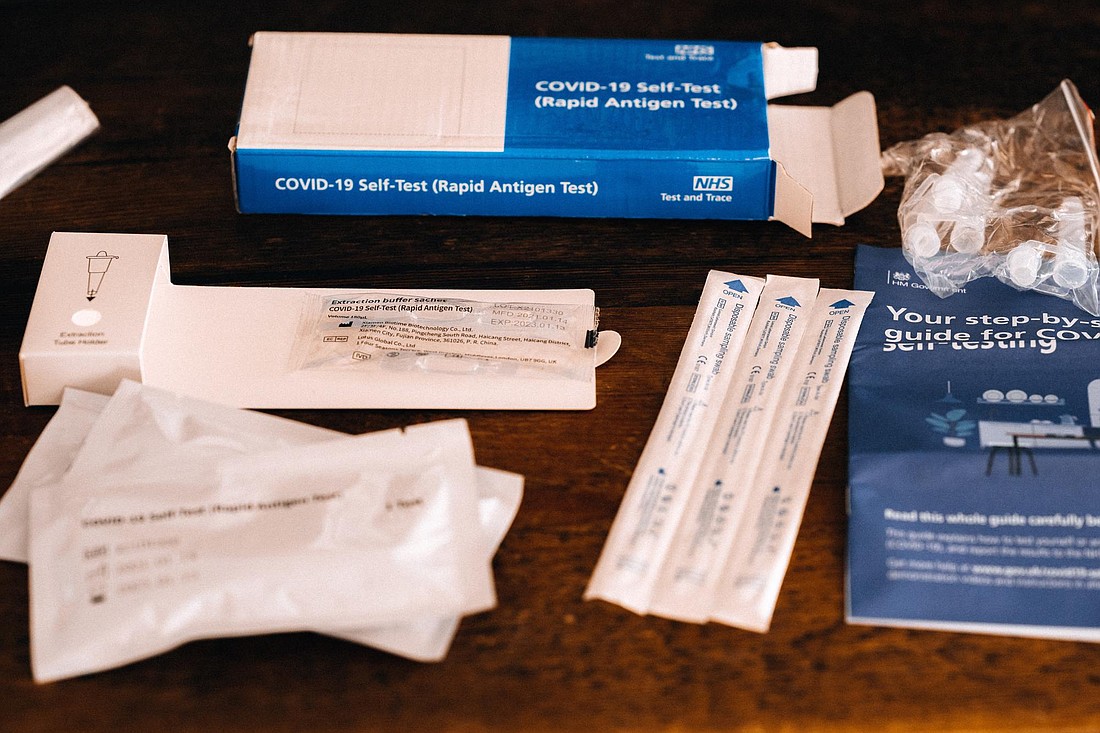- January 15, 2025
-
-
Loading

Loading

Gov. Ron DeSantis said Thursday, Jan. 6, the state is shipping about 1 million at-home coronavirus tests to nursing homes and assisted living facilities, with the kits set to arrive over the weekend.
The plan to distribute at-home tests directly to such facilities came as the Florida Department of Health issued new COVID-19 testing guidelines amid a surge in cases caused by the highly contagious omicron variant.
“What we’re going to start by doing is send them to our nursing homes and our long-term care facilities. And then beyond that, we’ll focus on senior-heavy communities,” DeSantis said during a news conference in West Palm Beach.
State Division of Emergency Management Director Kevin Guthrie said his agency would begin shipping the test kits on Thursday. Guthrie said the tests had been stockpiled during a “downturn” in coronavirus cases that led to less demand for testing.
“We had between 800,000 and a million test kits, Abbott (Laboratories) rapid test kits, in our warehouse that did expire. We tried to get them out prior to that, but there was not a demand for it,” Guthrie said.
Guthrie said the kits expired between Dec. 26 and Dec. 30, after the state received a three-month extension on their use in September. Guthrie said the emergency management division has asked the U.S. Department of Health and Human Services for another extension to be able to use the tests.
But as officials say the tests are being shipped, DeSantis said Thursday that the state had not received an answer from the federal government on whether the kits are still approved for use.
“If they’re not accurate, we don’t want to send out inaccurate tests. But they already were extended in September, there wasn’t a lot of demand for them. They’ve been sending them out as requested, there was no withholding anything. It’s just, the FDA (federal Food and Drug Administration) has not gotten back to DEM (the state Division of Emergency Management),” DeSantis said.
As coronavirus cases continue a sharp increase, DeSantis is emphasizing a “seniors first” approach to testing.
The governor and state Surgeon General Joseph Ladapo also are discouraging mass testing of people who do not have symptoms and are younger and have fewer risk factors. That was reflected in the testing guidelines published Thursday.
In a one-page document, the health department said people who are 65 or older, have chronic medical conditions or are pregnant or were recently pregnant face increased risks. The guidelines said such people should get tested for coronavirus “soon after symptom onset” and should “seek early monoclonal antibody or antiviral drug treatment and seek other medical treatment as necessary.”
People who have COVID-19 symptoms but no significant risk factors should consider getting tested after the onset of symptoms, the guidance said, but should “seek medical treatment only when necessary.”
For people with no symptoms who suspect they may have been exposed to COVID-19, “testing is unlikely to have any clinical benefits,” according to the guidelines.
Agriculture Commissioner Nikki Fried, a Democrat who is running for governor this year, blasted the governor for not distributing the state’s stockpile of at-home tests sooner.
“It’s bad enough that Governor DeSantis has deprioritized testing with omicron exploding across Florida, but it’s an absolute disgrace for the governor and his communications team to have lied and covered up the massive failure of a million unused tests while Floridians wait in hours-long lines for local tests that are running out,” Fried said in a prepared statement. “Now the governor has to beg President Biden for another waiver to even use these expired tests — should they still be safe and effective.”
The plan to deliver at-home tests is part of what DeSantis and Ladapo are calling “high-value testing,” or testing that the surgeon general said could lead to changes in clinical outcomes for people who would require treatment for COVID-19.
“We are in the middle of a surge. I’ve said this very often that it is important to us that people who have risk factors get tested when they have symptoms and then get connected with treatment,” Ladapo said.